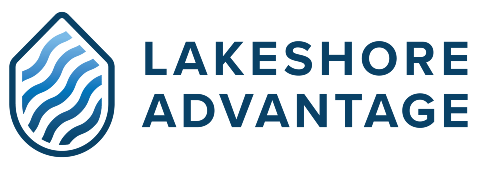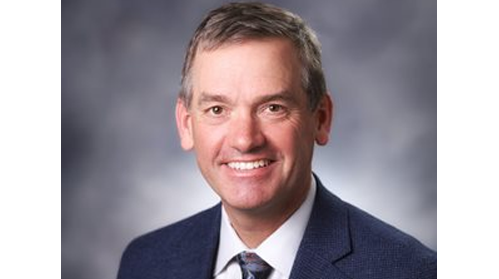Bill Hoefer, Market Leader for Corewell Health Pennock and Zeeland Hospitals, is a healthcare executive with over 28 years of experience leading a handful of hospitals across the country. Bill’s “true north” is working with his teams to ensure exceptionally high quality and safe care for the communities they serve, striving to ensure each member of the team—from receptionist to physician—is valued and appreciated. He also finds ways to be involved in efforts to support the community.
Over the years, Bill has led teams in mid- and large-sized community hospitals, independent hospitals, teams within large systems, and has had responsibility for the development of oncology and neuroscience service lines across large geographic areas. Bill and his wife Melissa will celebrate 25 years of marriage later this year and are parents to three high school and college-age children.
What led you down your professional path—from childhood interests to choices in educational focus and beginning your career? What were the key turning points for you?
As a child I would occasionally go to the hospital with my dad as he did rounds. Early on I was able to walk behind closed doors into radiology departments, surgery centers and physician lounges. As a child my world view was all kids grow up to work in hospitals! My dad was a physician and both my mom and step-mom were nurses. When I went to college, my vision was to follow in my dad‘s footsteps as a physician. I quickly realized I did not have an aptitude for success in organic chemistry or molecular biology, but I thrived in classes related to people, communication, and leadership.
In college I was introduced to a gentleman who ultimately influenced my career path. When he asked me “what would you like to do when you grow up?” I didn’t know that the answer would be what I am doing today. At the end of the conversation, he handed me a business card and said, “Bill, if you ever want to run a hospital, I’d like you to call me.” I later learned he was the Director of the Healthcare Administration program at Washington University School of Medicine in St. Louis. I took that fork in the road and never looked back.
What have you learned in your leadership role and what advice would you give to others in a new leadership role?
Working in healthcare leadership for 28 years, I have learned many lessons. Some of those lessons came with hard knocks, many came through work experiences, and others came through the generosity and wisdom of mentors. The most important piece of advice I would give to someone in a new leadership role is to invest substantial time in getting to know your team and the community. I learned when things are challenging, it is almost always team members at all levels, with deep organizational knowledge of systems, culture, people, and the community who bring stability to solve the problem. Our people are our number one, two, and three most valuable assets. We need to know them, appreciate them, and care for them.
The second bit of advice I would offer is to be as present and as engaging as possible at all levels of the organization. The faster a new leader can develop deep relationships throughout the organization, the more quickly that team will achieve seemingly insurmountable goals and bring its mission to life.
The final bit of advice I would offer is to lead authentically and with humility. Most successes an organization achieves will be the result of the team’s collective contributions. Teams are more likely to rally behind a leader who truly values the contributions of individual employees, acknowledges the person on the front line has the magic sauce that makes success happen, and acknowledges that the leader is just a small part of what makes wonderful things possible.
Talk to us about company culture. What are some values that you and your team live by?
Our values are expressing compassion, being collaborative, striving to create clarity, having curiosity, the courage to try new things, and have difficult conversations. The value that stands out the most to me involves collaboration. A big part of my role as a leader is to celebrate the team’s successes and highlight each of their many contributions. As a team, we are laser focused on providing exceptional care to our community. We know that care is delivered by the teams on our front lines. Our goal as a leadership team is to ensure those frontline team members know how important their contributions are, and how grateful we are as an organization for the time, energy, and knowledge they put into providing exceptional care.
What is a book that you have read or an influencer that you’ve listened to recently that has made you a better leader?
If you were to ask me, “Bill, what is the biggest difference in your life in the most recent three years prior to the past 30?” I would share I have become a voracious reader. Another bit of advice I would give to all leaders is to read a lot. Read about things you don’t know much about. Read about concepts you don’t agree with. Learn about history and especially those things that have negatively impacted our country, our society, and the individuals who make up our great nation. When you hear someone talk about a book and your first instinct is to say, “I do not agree with that,” read the book.
I recently read “Grant,” by Ron Chernow. This book reminds me of the great struggles our country has been through while trying to provide equal opportunity and equality to all. This book illustrated to me that we have taken great steps forward as a nation, but progress has often been followed by regression. It also reminded me when we come together as individuals to form a team, the individual contributors do not have the same foundation because the playing field we call life is not level. Inequity exists in terms of access to education, mentors, food, shelter, and access to activities that build knowledge and character. The inequity impacts our individual ability to overcome obstacles and thrive.
As leaders we need to be part of the effort to create opportunity for every person on our team so that, as teams, we can live to our fullest potential.
Can you share why it is a priority for you to invest in economic development?
Economic development strengthens the vibrancy of the communities that we live in and serve. Through economic development, we can attract more sophisticated businesses to our communities, which create jobs and support the financial stability for our families and neighbors.
Economic vibrancy for our community affords greater investment in education and activities for our children and ourselves. Without economic development it is more likely that we have an under-employed population, that we will not have the financial depth to maintain our community’s infrastructure, and that we will have social challenges that negatively affect individuals in our community.
Communities that are strong economically and have thriving and growing businesses are far less likely to have unemployment, crime, homelessness, poor health, and other challenges that drain our communities’ financial reserves. As an organization, we support economic development activities on the lakeshore and our hope is this is the “norm” for all individuals and organizations who call Ottawa and Allegan counties “home”.



